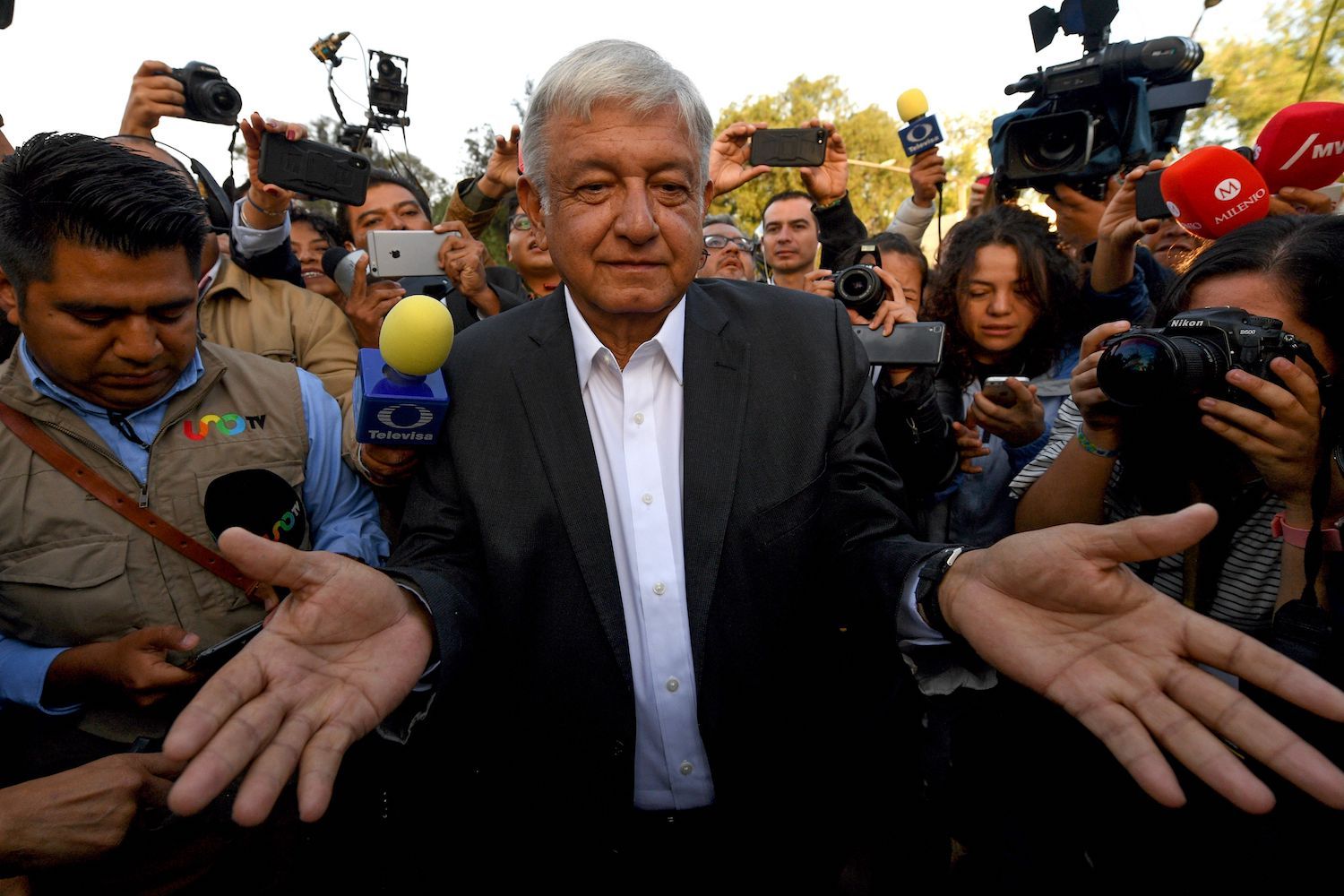Watching the July 1 election unfold in Mexico City, it was hard not to be caught up in voters’ enthusiasm for change. Andrés Manuel López Obrador, making his third attempt to be elected president on a left-of-center platform, won more than half the vote in a four-way race, defeating his closest challenger by 30 points. He won all but one of Mexico’s 31 states plus the capital city, most by wide margins, and his coalition appears to have won a majority in Mexico’s Congress, too. He will become president of Mexico on Dec. 1 with a broad mandate to reshape the country’s future, with a focus on the two issues that propelled him to victory: fighting corruption and reducing inequality.
But his election will affect the country’s foreign policy, too. Opponents have painted López Obrador as an old-style nationalist or perhaps even a fellow traveler of the authoritarian left in Latin America, but these characterizations are off base. There is no question that he has less enthusiasm for Mexico’s relationship with the United States than any of his recent predecessors, who all prioritized the neighbor to the north, and he is more skeptical of global entanglements generally. But López Obrador is ultimately more of a pragmatist than an ideologue when it comes to foreign policy.
Indeed, he is likely to see foreign policy through the lens of what helps him advance his domestic agenda, and that means managing international affairs in ways that help improve social development and avoid economic shocks while also improving the country’s image abroad. In the end, this is likely to lead to greater continuity in Mexico’s foreign policy than most observers expect. Although López Obrador’s leftist and nationalist leanings will undoubtedly diverge from current foreign-policy patterns, there is unlikely to be a rupture.
Although López Obrador’s leftist and nationalist leanings will undoubtedly diverge from current foreign-policy patterns, there is unlikely to be a rupture.
Since the 1980s, Mexican presidents have been particularly focused on the relationship with the United States, and this momentum intensified after the signing of the North American Free Trade Agreement (NAFTA) in 1992. The waves of Mexican migration to the United States in the 1990s and early 2000s accentuated this trend, since more than 10 percent of Mexico’s citizens now live in the United States and the Mexican government operates 50 consulates there. The rise of organized crime groups that traffic drugs to the United States and return profits from U.S. drug sales to Mexico created yet another area of intense cooperation between the two governments after 2006, when Mexico’s homicide rate began to rise.
Over time, these areas of engagement — and the real interconnectedness between Mexico and the United States — led to greater cooperation on other international issues, including Central American migration, the crisis of governance in Venezuela, and intelligence sharing on potential terrorist threats in the hemisphere. Mexico’s votes at the United Nations have also increasingly converged with those of the United States.
To be sure, there have always been areas of disagreement, such as the Iraq War, and Mexico has wisely tried to maintain an independent foreign policy on some global issues, such as climate change. Moreover, parts of Mexico’s foreign-policy establishment also remain firmly tied to the country’s traditional doctrine of nonintervention, which meant that Mexico rarely took positions that were critical of other countries and preferred active participation in global institutions to bilateral relationships that could lead to long-term entanglements, even though recent presidents largely abandoned this approach.
López Obrador will be unique among modern Mexican presidents in that he will start his term with skepticism about his country’s intense engagement with the United States
López Obrador will be unique among modern Mexican presidents in that he will start his term with skepticism about his country’s intense engagement with the United States
and in global affairs generally. He and his advisors have frequently pointed to their desire to return to a policy of nonintervention, downplaying the bilateral relationship with the United States and avoiding interference in thorny issues such as Venezuela’s current crisis. But the real shift will be less ideological than a question of focus. “His focus is the social question, [on] inequality in Mexico,” Lorenzo Meyer, one of Mexico’s most respected historians who is close to López Obrador, explained to me in an August 2017 interview when asked about the then-presidential candidate’s priorities and whether he would focus much on foreign policy. In this regard, López Obrador perhaps sounds a little like Donald Trump on the campaign trail, though he emphasizes inequality rather than growth.
But López Obrador also understands that in order to achieve his ambitious social goals at home — especially reducing poverty and inequality — he needs to manage the U.S. relationship wisely. He and his advisors have made clear repeatedly that they don’t want to see NAFTA collapse, because that would be disastrous for the Mexican economy which depends on exports for roughly a third of its GDP — 80 percent of which go to the United States.
“I think we can have a good relationship, a respectful one, [with] mutual cooperation,” López Obrador told me in a September 2017 interview, shortly before the campaign started. Despite criticizing Trump’s policies toward immigrants, he has repeated his desire to get along with the U.S. president constantly during the campaign and even mentioned it in his victory speech on Sunday night. Trump wisely congratulated him shortly after the results were announced, and Marcelo Ebrard, a foreign-policy advisor to López Obrador, acknowledged the congratulations on behalf of the president-elect.
Indeed, the appointment of Ebrard — who, like López Obrador, is a former mayor of Mexico City and one of Mexico’s shrewdest and most worldly politicians — as a key foreign-policy advisor suggests a highly pragmatic turn for his foreign policy. The president-elect made the announcement during his victory speech, and it was clearly meant as a signal that he was not just falling back into old patterns of inward-looking nationalism but rather ready to engage with the world.
Yet this pragmatism doesn’t mean that there won’t be changes. López Obrador is likely to pay less attention to foreign policy than other presidents and to see it in functional terms. He will likely judge the wisdom of engagement on whether it produces tangible benefits for his domestic economic and social agenda.
He will likely judge the wisdom of engagement on whether it produces tangible benefits for his domestic economic and social agenda.
This means he’ll be far less likely to appease the U.S. government in hopes of getting something else down the road, as other Mexican leaders have done, for example, by agreeing to address Central American migration in return for concessions on NAFTA. And while early wins in the relationship could breed greater cooperation down the road, early clashes with the Trump administration could instead lead to rapid distancing between the two countries.
There are a few areas that will undoubtedly test the relationship early on. The fate of the NAFTA negotiations is one of them. While López Obrador was an early critic of the agreement, which he and most on the left saw as mostly benefiting big corporations, he knows that a collapse of the agreement now would generate economic turmoil and undermine his efforts to fight poverty. So, while he is unlikely to go to the same extremes as the current government to try to save NAFTA, he’ll negotiate with the goal of keeping it in place. If the Trump administration decides to pull out, it will be taken as an early sign that dealing with the U.S. government is a risky endeavor that produces few benefits.
Migration issues will provide yet another area of contention early on, which may help set the tone — for better or worse — between the two governments. López Obrador has been critical of enhanced immigration enforcement efforts in the United States but also recognizes that Mexico can do little to change internal policies in a neighboring country. Still, the tone used by U.S. political leaders toward Mexican immigrants — and U.S. government behavior at the border — may well shape how much latitude he feels he has to deal with the Trump administration on migration issues, including efforts to deal with Central American migration through Mexico.
This is particularly important since Mexico’s government actually carries out more deportations of Central American migrants than the U.S. government does
Mexico’s government actually carries out more deportations of Central American migrants than the U.S. government does
, according to statistics compiled by the Migration Policy Institute, and this has made Mexico a de facto buffer against greater unauthorized immigration flows to the United States. López Obrador could well decide that it is no longer in Mexico’s interest to play that role if migration becomes a toxic area in the relationship and reduce current immigration enforcement efforts in Mexico. Conversely, if he can find common ground with Trump on migration — perhaps U.S. support for enhancing Mexico’s asylum system and integration programs for Central Americans who want to stay in Mexico and Mexicans living in the United States who want to return home — this could turn into a virtuous circle of cooperation.
Finally, a López Obrador administration will almost certainly want to stake out some differences with the United States on global issues to show that Mexico is not a U.S. puppet. Whether he does this on the Paris climate accords, the global compact on migration, or another issue area, such as the current crises in Venezuela and Nicaragua, where Mexico might pursue a separate strategy along with other Latin American countries, it would allow him to show some distance from U.S. policies and help him preserve the aura of autonomy he needs to keep his support base.
Most presidents around the world come to office knowing far less about foreign policy than they do about domestic issues. In the case of López Obrador, who was elected due to his promises to fight corruption and inequality, the overwhelming focus on domestic policy may be even greater. But this does not mean that Mexico is withdrawing from the world or that it plans to blow up its relationship with the United States. It simply means that the initial focus on foreign policy will come through the prism of domestic challenges and that early wins in the relationship with the United States could generate greater engagement over time. On the other hand, a difficult relationship with the Trump administration could also drive a López Obrador government to return to an older brand of inward-looking foreign policy.





